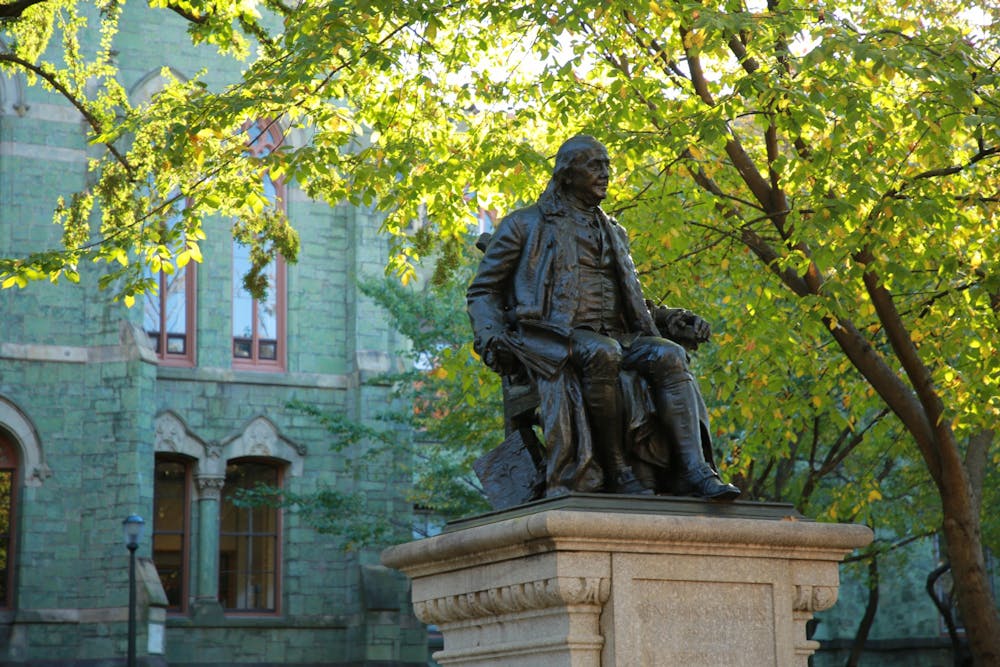
Two students admitted to Penn – rising College sophomore Annabelle Choi and her sister, incoming College first year Madeline Choi – have recently been accused of plagiarism in a Change.org petition. The petition was organized by "For Justice in College Applications" and has now received 5,845 signatures. The petition claims that the siblings “have published, plagiarized, and fabricated research papers with their peers over the years, writing on topics as far-ranging as communications, neuroscience, psychology, dental science, and criminal justice.” Both siblings were admitted to Penn’s seven-year bio-dental program.
An article by The Daily Pennsylvanian analyzed the materials and found that both sisters committed empirically provable plagiarism. In response to the DP’s request for a comment, Annabelle Choi wrote “innocent until proven guilty.” While "innocent until proven guilty" underpins our ideals of American justice, there is a plethora of evidence to suggest otherwise in this situation.
Universities and higher education institutions are widely known for their emphasis on academic integrity, and Penn is no exception. In the Pennbook, a collection of policies related to student conduct and academic integrity, it states that “since the University is an academic community, its fundamental purpose is the pursuit of knowledge. Essential to the success of this educational mission is a commitment to the principles of academic integrity.” This ethical code should underscore not only all of Penn students’ endeavors, but also those applying to Penn. Notably, maintaining academic integrity is foundational in a hyper-competitive environment, especially in admission cycles where even the smallest details can be the difference between an acceptance and a rejection.
The deeply frustrating characteristic of this situation is that fabrication and plagiarism usually give students a significant advantage in a hyper-selective admissions process, where 94% of applicants are not accepted. Most students who desire to attend Penn or schools of a similar caliber dedicate years of their lives for potential admission; thus, each admission spot — especially those in specialized programs — are highly coveted.
Oftentimes when plagiarism occurs, it is to obtain an unfair advantage. However, we would be remiss as a community to criticize those involved without contextualizing it. The current atmosphere of elite college admissions is so flawed and cutthroat that students often sacrifice their sleep, mental health, and — as appears to have occurred in this case — their integrity, to aggrandize their chances of admission. This case precisely illustrates that the societal pressures to have immense success at such a young age are ludicrous.
Educational institutions across the country, including high schools and colleges, should do better to encourage students to be honest with one another about the work they do and the academic pressures they experience along the way. These institutions should emphasize that staying true to one’s passions, rather than altering them to the model of the perfect elite student, is invaluable. The reality that lifelong success is not dependent on attending a top-tier university should also be made known.
I hope universities, in doing so, will prevent others from feeling compelled to breach ethical codes to achieve what they perceive as so-called success in school and beyond. Contrary to what many students believe, it’s okay to not have conducted research with a world-renowned professor or to have published work in college, let alone in high school. It’s okay if people are ahead of you in certain fields because you’re still trying to figure out your passions and interests. Committing to what you are passionate about and capable of, regardless of how big or small the activity is, will always be better than fabricating materials and exceeding expectations by astronomical measures. Life will always be more richly rewarding if it is lived in pursuit of genuine work and interests rather than stolen or fabricated ones.
Although it is unknown if the research that is the subject of the plagiarism allegations informed the Choi siblings’ admissions decisions, a university with great prestige and selectivity like Penn should review its applications more thoroughly, especially with published work. Admissions committees in selective universities must recognize how systemically detrimental it is to enable students who intentionally misrepresent others’ work as their own to gain admission.
Higher education institutions often foster many future leaders in this country — how can we trust our future leaders if higher institutions don’t check for plagiarism and falsities when some people might have willfully pursued behaviors like plagiarism? How can we maintain trust in the purportedly holistic admissions process that seemingly fails to be just? And, finally, what does this say about our country as a whole, a country that supposedly values fairness, equality, and truth so highly?
I believe that being able to attend an institution of higher education in the United States is a great privilege, partially because most universities heavily emphasize the ideal that knowledge is the pursuit of truth: Yale University’s motto is “lux et veritas”, and Harvard University’s is simply “veritas,” translating to light and truth, and truth, respectively. We must all remember that these values are at the heart of higher education’s purpose: truth in who we are, what we pursue, and what we create.
ALLISON SANTA-CRUZ is a rising College sophomore studying communications from Jackson, Miss. Her email address is allisant@sas.upenn.edu.
The Daily Pennsylvanian is an independent, student-run newspaper. Please consider making a donation to support the coverage that shapes the University. Your generosity ensures a future of strong journalism at Penn.
Donate







